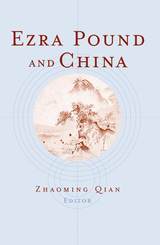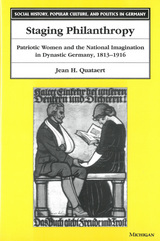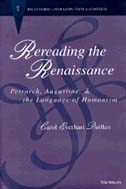3658 scholarly books by University of Michigan Press and 4
have author last names that start with Q
3658 scholarly books by University of Michigan Press and 4
3658 scholarly books by University of Michigan Press
4 have author last names that start with Q have author last names that start with Q
4 have author last names that start with Q have author last names that start with Q

Ezra Pound and China
Zhaoming Qian
University of Michigan Press, 2003
Ezra Pound and China, the first collection to explore the American poet's career-long relationship with China, considers how Pound's engagement with the Orient broadens the textual, cultural, and political boundaries of his modernism. The book's contributors discuss, among other topics, issues of cultural transmission; the influence of Pound's Chinese studies on twentieth-century poetics; the importance of his work to contemporary theories of translation; and the effects of Confucianism, Buddhism, and Taoism on Pound's political and economic thought.
Richly illustrated, the book draws readers closer to the heart of Pound's vision. Ezra Pound and China will become an invaluable resource to students and scholars of Pound, cultural studies, translation theory, poetics, Confucianism, and literary transmission and reception.
Zhaoming Qian is Professor of English, the University of New Orleans.
Richly illustrated, the book draws readers closer to the heart of Pound's vision. Ezra Pound and China will become an invaluable resource to students and scholars of Pound, cultural studies, translation theory, poetics, Confucianism, and literary transmission and reception.
Zhaoming Qian is Professor of English, the University of New Orleans.
[more]

Staging Philanthropy
Patriotic Women and the National Imagination in Dynastic Germany, 1813-1916
Jean Helen Quataert
University of Michigan Press, 2001
Staging Philanthropy is a history of women's philanthropic associations during Germany's "long" nineteenth century. Challenged by the French Revolution and the Napoleonic occupation and war, dynastic groups in Germany made community welfare and its defense part of newly-gendered social obligations, sponsoring a network of state women's associations, philanthropic institutions, and nursing orders which were eventually coordinated by the German Red Cross. These patriotic groups helped fashion an official nationalism that defended conservative power and authority in the new nation-state.
An original and truly multi-disciplinary work, Staging Philanthropy uses archival research to reconstruct the neglected history of women's philanthropic organizations during the 'long' nineteenth century. Borrowing from cultural anthropologists, Jean Quataert explores how meaning is created in the theater of politics. Linking gender with nationalism and war with humanitarianism, Quataert weaves her analysis together with themes of German historiography and the wider context of European history.
Staging Philanthropy will interest readers in German history, women's history, politics and anthropology, as well as those whose interest is in medicalization and the German Red Cross. This book situates itself in the middle of a string of debates pertaining to modern German history and, thus, should also appeal to readers from the general educated public.
Jean Quataert is Professor of History and Women's Studies, Binghamton University. She has previously published a number of books, including Connecting Spheres: European Women in a Globalizing World, 1500 to the Present with Marilyn J. Boxer (Oxford, 1999).
An original and truly multi-disciplinary work, Staging Philanthropy uses archival research to reconstruct the neglected history of women's philanthropic organizations during the 'long' nineteenth century. Borrowing from cultural anthropologists, Jean Quataert explores how meaning is created in the theater of politics. Linking gender with nationalism and war with humanitarianism, Quataert weaves her analysis together with themes of German historiography and the wider context of European history.
Staging Philanthropy will interest readers in German history, women's history, politics and anthropology, as well as those whose interest is in medicalization and the German Red Cross. This book situates itself in the middle of a string of debates pertaining to modern German history and, thus, should also appeal to readers from the general educated public.
Jean Quataert is Professor of History and Women's Studies, Binghamton University. She has previously published a number of books, including Connecting Spheres: European Women in a Globalizing World, 1500 to the Present with Marilyn J. Boxer (Oxford, 1999).
[more]

Radical Poetics
Khadijah Queen
University of Michigan Press, 2025
Literature has the power to help build a shelter in language for a way of being that holds integrity and love as its root. In the tradition of Audre Lorde, Angela Davis, and many other Black writers and theorists, poet and professor Khadijah Queen observes questions of life and literature, human feeling and behavior, and explores language-based solutions to common cultural conflicts that are often rooted in harmful assumptions.
Instead of operating from a base of unquestioned thought and systemic tradition, Radical Poetics presents more inclusive and accurate ways of contemplating literary work. Building on ideas and theoretical practices in Édouard Glissant, Toni Morrison, bell hooks, Saidiya Hartman, and Kimberlé Crenshaw, Queen reads for where love is present as well as for where it is absent—tracing systems of thought and aesthetic choices to track how characters are portrayed in terms of race, gender, class, and disability. She analyzes short stories, novels, nonfiction narratives, poetry, and a play from authors such as Herman Melville, Kate Chopin, Dionne Brand, Frances Ellen Watkins Harper, Ma-ka-tai-me-she-kia-kiak, Sor Juana Inés de la Cruz, Natasha Trethewey, and Muriel Rukeyser. Queen’s essays offer shifts in thinking about language—beyond calling out the ways language punishes vulnerability, entrenches harm, and suppresses true intercultural communication. Her intuitive approach aims to correct inaccuracies that have served as a foundation for the discriminatory thinking that undergirds American institutions and culture, particularly the continued glorification of violence. Radical Poetics makes a case for the imperative and practical value of understanding poetics beyond artistic and academic spaces and into everyday life.
Instead of operating from a base of unquestioned thought and systemic tradition, Radical Poetics presents more inclusive and accurate ways of contemplating literary work. Building on ideas and theoretical practices in Édouard Glissant, Toni Morrison, bell hooks, Saidiya Hartman, and Kimberlé Crenshaw, Queen reads for where love is present as well as for where it is absent—tracing systems of thought and aesthetic choices to track how characters are portrayed in terms of race, gender, class, and disability. She analyzes short stories, novels, nonfiction narratives, poetry, and a play from authors such as Herman Melville, Kate Chopin, Dionne Brand, Frances Ellen Watkins Harper, Ma-ka-tai-me-she-kia-kiak, Sor Juana Inés de la Cruz, Natasha Trethewey, and Muriel Rukeyser. Queen’s essays offer shifts in thinking about language—beyond calling out the ways language punishes vulnerability, entrenches harm, and suppresses true intercultural communication. Her intuitive approach aims to correct inaccuracies that have served as a foundation for the discriminatory thinking that undergirds American institutions and culture, particularly the continued glorification of violence. Radical Poetics makes a case for the imperative and practical value of understanding poetics beyond artistic and academic spaces and into everyday life.
[more]

Rereading the Renaissance
Petrarch, Augustine, and the Language of Humanism
Carol Everhart Quillen
University of Michigan Press, 1998
Although Francesco Petrarca's position as the "father" of Italian Renaissance humanism has long been acknowledged, the specific meanings of his works and his legacy remain matters of controversy. Basic questions about the tension between his devotion to secular pursuits and his respect for religious withdrawal, about the authenticity of his ostensibly autobiographical writings, and about his relationship to scholasticism still provoke sustained debate. Rereading the Renaissance, a study of Petrarch's uses of Augustine, uses methods drawn from history and literary criticism to establish a framework for exploring Petrarch's humanism by approaching it through it central practices of reading and writing.
Carol Quillen argues that the essential role of Augustine's words and authority in the expression of Petrarch's humanism is best grasped through a study of the complex textual practices exemplified in the writings of both men. Petrarch's reliance on Augustine is most evident in his ways of reading and in his strategies of argument. Secondly, she maintains that Petrarch's appropriation of Augustine's words is only intelligible in light of his struggle to legitimate his cultural ideals in the face of compelling opposition. Finally, Quillen shows how Petrarch's uses of Augustine can simultaneously uphold his humanist ideals and challenge the legitimacy of the assumptions on which those ideals were founded.
Interdisciplinary in scope and method, this volume speaks to important debates that span the humanities. Scholars of literary and historical studies, as well as those in the fields of classical studies, patristics, and comparative literature, will find in Rereading the Renaissance a solid contribution to their interests.
Carol Everhart Quillen is Associate Professor of History, Rice University.
Carol Quillen argues that the essential role of Augustine's words and authority in the expression of Petrarch's humanism is best grasped through a study of the complex textual practices exemplified in the writings of both men. Petrarch's reliance on Augustine is most evident in his ways of reading and in his strategies of argument. Secondly, she maintains that Petrarch's appropriation of Augustine's words is only intelligible in light of his struggle to legitimate his cultural ideals in the face of compelling opposition. Finally, Quillen shows how Petrarch's uses of Augustine can simultaneously uphold his humanist ideals and challenge the legitimacy of the assumptions on which those ideals were founded.
Interdisciplinary in scope and method, this volume speaks to important debates that span the humanities. Scholars of literary and historical studies, as well as those in the fields of classical studies, patristics, and comparative literature, will find in Rereading the Renaissance a solid contribution to their interests.
Carol Everhart Quillen is Associate Professor of History, Rice University.
[more]
READERS
Browse our collection.
PUBLISHERS
See BiblioVault's publisher services.
STUDENT SERVICES
Files for college accessibility offices.
UChicago Accessibility Resources
home | accessibility | search | about | contact us
BiblioVault ® 2001 - 2024
The University of Chicago Press









